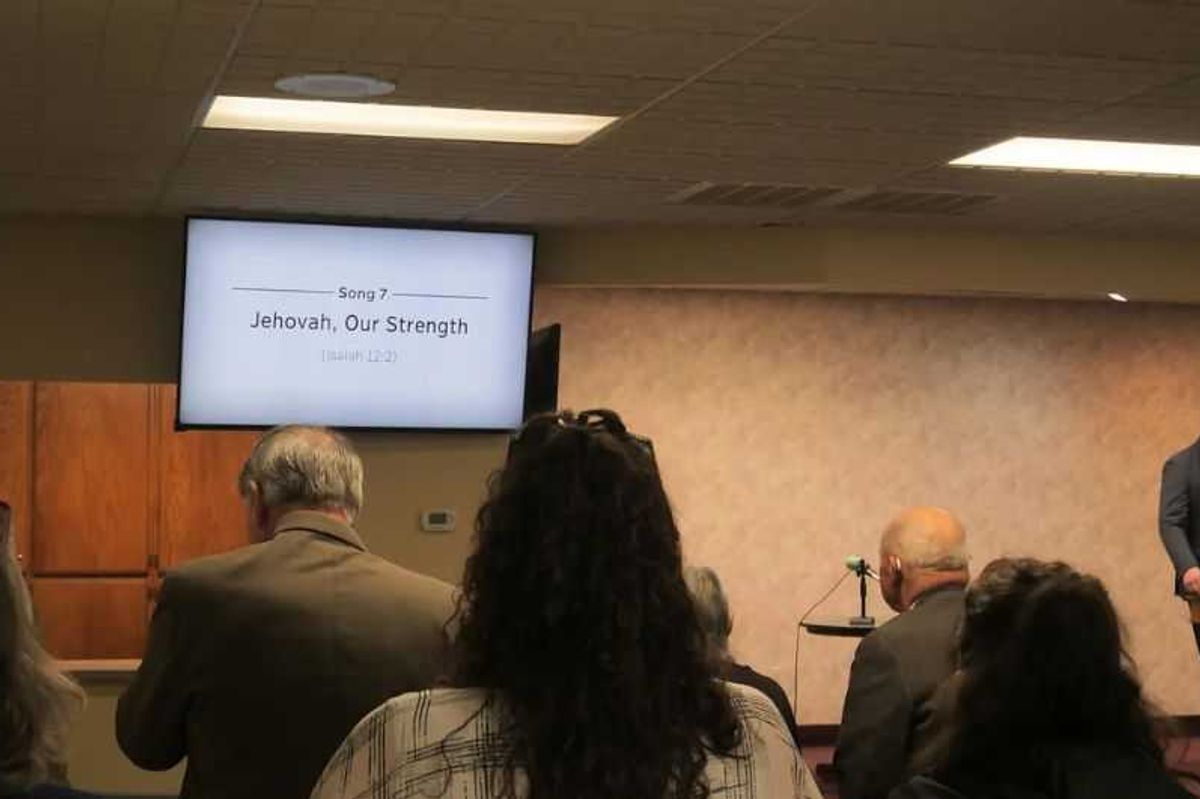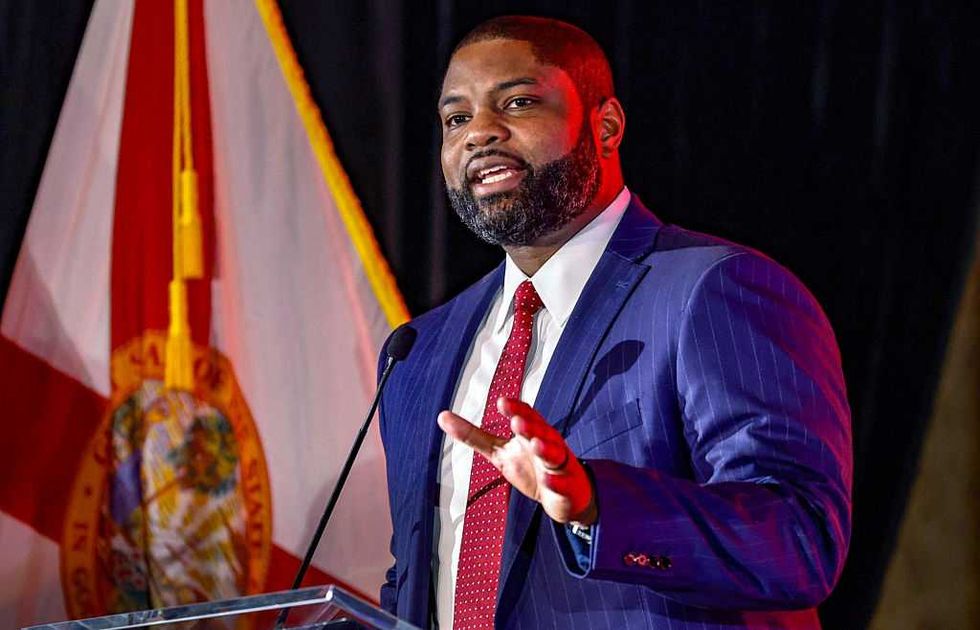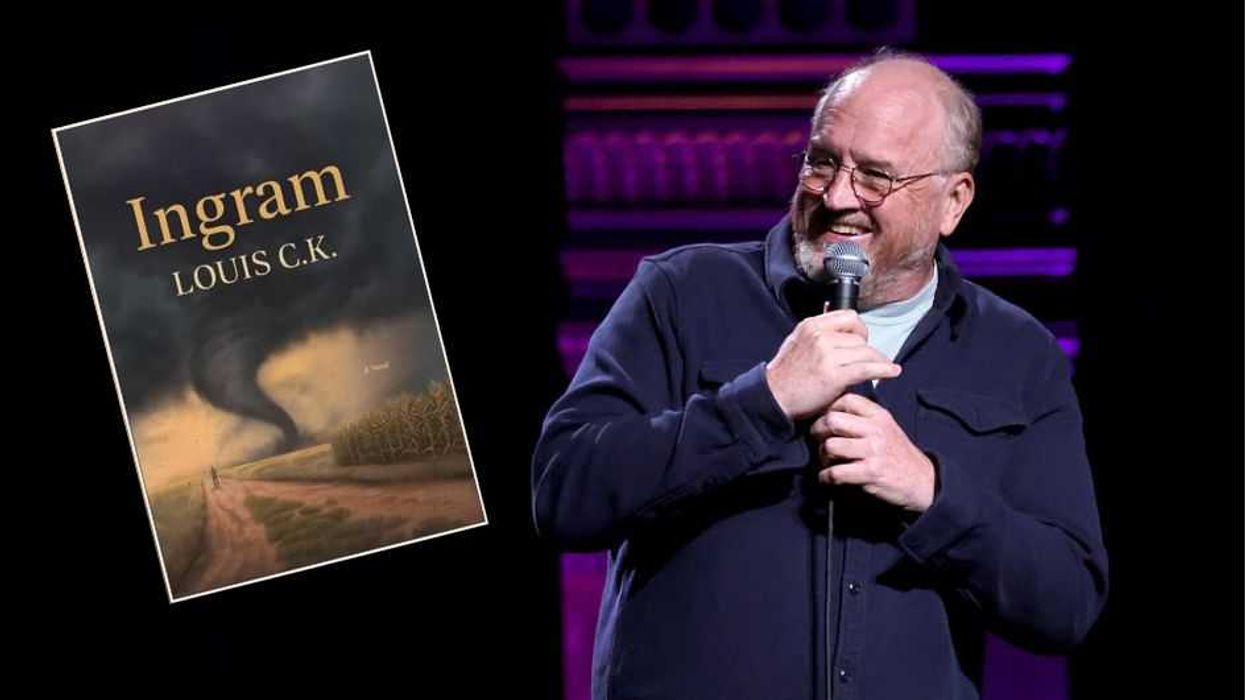
Day: November 24, 2025
Attorney general letitia james • Conservative Review • Daily Caller News Foundation • Dailycaller.com • FBI Director James Comey • Newsletter: Politics and Elections
Judge Dismisses Indictments Against Letitia James, James Comey Over Prosecutor’s Appointment
A federal judge found interim U.S. Attorney Lindsey Halligan’s appointment unlawful on Monday. Judge Cameron Currie dismissed cases against former FBI Director James Comey and New York Attorney General Letitia James, who both challenged Halligan’s appointment. “I agree with Mr. Comey that the Attorney General’s attempt to install Ms. Halligan as Interim U.S. Attorney for […]
Abide • Blaze Media • Christianity • Cults • Faith • Jehovah's witnesses
Jehovah’s Witnesses: Worshipping with the most hated denomination

After attending a somewhat run-of-the-mill novus ordo Mass with only a few redeeming qualities, my husband and I decided to visit another church in Nevada that is possibly one of the most hated and misunderstood Christian denominations — even with the Latter-day Saints and Seventh-day Adventists.
It was both his and my first time attending a Jehovah’s Witness church.
‘I personally don’t want to go to heaven, but want to remain on Earth when we’re resurrected. I want to live among the animals and trees and plants and not rule over others.’
We walked 40-some minutes to the Kingdom Hall of Jehovah’s Witnesses and were greeted warmly, even though we were two minutes late and the congregation had already begun singing the first hymn. The setting might have been bland, but I felt I had achieved a bucket-list goal.
For years I’d tried to visit a Kingdom Hall. The Jehovah’s Witnesses were one of the last churches to reopen nationwide after COVID, offering online meetings for nearly two and a half years, until summer of 2022. Even after that, many remained closed for another year, and a large portion still host hybrid Zoom/in-person gatherings for the immune-compromised.
Kingdom Hall
To many, the inside of the meeting hall would appear no different from a conservative Protestant church. Most women wore skirts or business suits; the men were in full suits. The carpet was gray, the walls plain, decorated with a few pictures of flowers. There were no windows.
Rows of theater chairs faced a pulpit. Though the Jehovah’s Witnesses do not have ordained ministers, any baptized man may teach from Scripture. On the day we visited, a guest speaker from Idaho — tailored suit, bright red tie — delivered a sermon much like any Protestant pastor’s, citing extensive Bible verses to support his points. There was no American flag, unsurprising given JW pacifism. Jehovah’s Witnesses do not vote, and while they don’t forbid self-defense, they register as conscientious objectors during drafts. They believe that those who live by the sword will die by the sword (Matthew 26:52).
RELATED: Church-hopping: Confessions of an itinerant worshipper
 Keturah Hickman
Keturah Hickman
The sermon
The message, titled “Is There in Fact a True Religion from God’s Standpoint?” began with statistics: 85% of the world identifies as religious, 31% Christian, across 45,000 denominations — with a new one forming every 2.2 days. “But how does Jehovah want to be worshipped?” he asked.
He read from Mark 7:6-7 and James 1:26, then cited Solomon: True religion is to fear God and keep His commandments (Ecclesiastes 12:13). More verses followed — Isaiah 48:17-18, Micah 6:8, Matthew 7:16 — arguing that true belief and conduct must fit like a well-tailored suit, not mismatched pieces.
He condemned most Christian denominations for justifying slavery so that men might Christianize pagan souls for the kingdom of God. He pointed out that the Jehovah’s Witnesses never supported such horrid beliefs. (He failed to mention that slavery was already abolished by the time they came along.) He warned against fatalism, ancestor worship, and faith in human institutions. “If a religion permits or promotes practices the Bible condemns, it is not true,” he said, citing Colossians 3:10, John 8:32, James 3:17-18, and others.
“Truth is found in the word of God,” he concluded. “When we love the word, we are peaceable.”
The sermon ended with the JW hymn “My Father, My God and Friend (Hebrews 6:10).”
All along the Watchtower
After the hymn, an elder read from “The Watchtower,” the denomination’s monthly study magazine. Before the group was called Jehovah’s Witnesses, it was the Watch Tower Society, founded by Charles Taze Russell in 1881.
The article that day was “Jehovah Heals the Brokenhearted” (Psalm 147:3). The elder read each paragraph aloud, then passed the microphone for congregants — men and women, in person or on Zoom — to share reflections.
Here are some highlights.
- Satan wants us to wallow in our feelings. Jehovah wants us to defy Satan and serve Him. When we do that, He sees us and is moved to help us.
- Jehovah doesn’t keep track of our sins, but only of the good we do.
- Jehovah does not put a time limit on our prayers as if it were a therapy session. We can pray to Him for as long as we like, and He’ll keep listening.
- The Son’s sacrifice forgives our past sins so we can move ahead into the future.
- We can comfort each other by being gentle and genuine.
- We are not to blame for how others hurt us.
It was repetitive but sincere — an hour-long group meditation on comfort and resilience.
The service ended with another hymn. There was no tithe, and communion is held only once a year for those who believe they are among the 144,000 destined for heaven.
The congregants
Afterward, several congregants welcomed us. One woman, Linda, about 70, explained that she had converted from Protestantism before marrying.
“There aren’t many differences between us and other churches,” she said, “except that we don’t teach what other places teach.”
“Such as?”
“We teach that Jehovah is Almighty God and that Jesus is His son and our Messiah. And we don’t believe in hellfire,” she said. “You can’t really find that idea in the Bible.”
I asked her if that meant that she believes everyone goes to heaven or if they just die.
She said, “The Bible says 144,000 go to heaven to be kings and priests to be the government of the kingdom of heaven that will come to Earth. I personally don’t want to go to heaven, but want to remain on Earth when we’re resurrected. I want to live among the animals and trees and plants and not rule over others.”
Linda gave me a small Bible — I gladly accepted it because it was lightweight and would fit perfectly into my backpack, and until now I had only been able to carry a New Testament. She explained to me that the Jehovah’s Witnesses didn’t approve of many of Scofield’s notes in the KJV and that their version had more accurate cross-references. I love having various versions of the Bible to read through, so there was no complaint from me!
She invited us to join her husband and friends at a cafe for a late lunch. And so we went with about 20 other congregants. I sat by a woman just a little older than I. Ozzy had been raised in the Jehovah’s Witnesses and had spent much of her youth as a traveling nanny. She told me that nearly six years ago she had married a Grace Baptist Church man and had a daughter with him. They eventually divorced. “I’m just grateful my daughter is learning about God in both homes she’s raised in,” she said.
Although Ozzy did not speak ill of her ex-husband, it was clear that she thought her expression of faith was more valid than his. So I asked her what was different between the two theologies, in her opinion.
“That’s a good question,” Ozzy said. “Not much.”
Then she added:
Except how we define the Trinity — you know, you can’t find that word in the Bible. I’ve searched every translation of the Bible, so I know. We both believe in the concept, though JW is more literal and bases their definition on how the Bible describes it. We believe that the Father, the Son, and the Holy Spirit are three separate entities united by a common will. Grace Bible Church is more Catholic when they talk about the Trinity.
After a day with them, I found them sincere and Bible-focused, hardly cult-like. They loved God, quoted Scripture freely, and treated us with warmth — even when I somewhat aggressively asked about one of their more infamous beliefs.
“I have heard that your church does not allow people to get blood transfusions and that this has caused many people to die.”
“Yes, we believe blood is sacred and not to be spilled in war nor ingested for any reason,” Linda responded. “But blood can be divided into four components, and it is okay to receive any of those minor fractions.
“Most people don’t even need blood transfusions as much as they used to,” she added, noting that “scientists have discovered that there are healthier ways to fill a low blood count with supplements and iron.”
Are the Witnesses a cult?
I’m not sure what makes a group a cult any more. Some say it’s when people follow a man rather than the Bible — but the Jehovah’s Witnesses have no central figure. They encourage personal Bible study.
Interestingly, 65% of members are converts — adults who join by conviction, not birth. While many leave, those who stay do so deliberately. Angry ex-members exist in every religion, and that alone doesn’t define a cult.
Much of JW doctrine is nothing your average Protestant would quarrel with: anti-abortion but pro-birth-control, personal responsibility for family size, and no institutional oversight (beyond guidance from JW Broadcasting in New York). There’s also no enforcement mechanism for rules on blood transfusions or holidays.
There are 8.6 million Jehovah’s Witnesses worldwide, compared to 15.7 million Jews, 17 million Mormons, and 22 million Seventh-day Adventists. Many Protestants single out the denomination’s rejection of transfusions, but the Jehovah’s Witnesses are neither faith healers nor anti-medicine. They are pacifists but politically moderate and scientifically literate.
Charles Taze Russell
Jehovah’s Witnesses founder Charles Taze Russell was raised Presbyterian. At age 13 he left his church to embark upon a kind of quest for the truth, for a time backsliding into unbelief.
Known for writing Bible verse on fences as a way to evangelize, he founded a group called the Bible Student Movement in 1879. Much like Mormons, the Two by Twos, and the Jim Roberts Group, his group grew by sending out pairs of men to preach the word of God directly from the Bible.
Despite Russell’s zeal, his life was riddled with scandal. He divorced his wife after she demanded a larger editorial influence on “The Watch Tower.” He sued for libel often, occasionally winning — one time the jury mockingly ruled in his favor but gave him only one dollar, and so he filed an appeal and received $15,000.
After wrongly predicting the end of the world numerous times, Russell died in 1931. The group split apart. Approximately a quarter of the members remained faithful to Russell’s successors and began calling themselves Jehovah’s Witnesses.
Their use of the name “Jehovah” also irritates critics, though it appears in the King James Bible (Exodus 6:3; Psalm 83:18; Isaiah 12:2; 26:4).
Their rejection of the Nicene Trinity remains the sharpest point of division — a doctrine codified by the Catholic Church and later adopted by nearly all of Protestantism. It’s an irony of history: Protestants who define themselves against Rome still use Rome’s creed as the boundary of belief. Disagreement with that doctrine, however, does not make a faith a cult.
The trend to schism
One striking point from the sermon stayed with me: Every 2.2 days a new denomination is created.
Until the 16th century, Christianity had only a handful of branches. Now there are 45,000. The JW speaker said it is because everyone seeks truth; I think it’s because we’ve forgotten love.
As Paul wrote in 1 Corinthians 13: “If I have all faith so as to move mountains but do not have love, I am nothing.”
What merit is truth without love? God does not honor self-righteous division. This, perhaps, was Martin Luther’s and Henry VIII’s greatest sin — their pride tore Christ’s body into pieces.
Protestants readily maintain friendly regard for Judaism, which does not accept Christ’s divinity, while showing far less tolerance for groups such as Jehovah’s Witnesses, Mormons, or Adventists — who profess Jesus as Lord and Redeemer.
For this reason, I urge believers: Visit all churches. Seek unity where possible. Not to follow fads, but to love the whole body of Christ — even the Jehovah’s Witnesses.
Armed Florida homeowner fights back against 4 thugs who reportedly try to force their way into his residence

Four unidentified individuals arrived at a south Florida home Saturday evening and tried to force their way inside, the Miami-Dade Sheriff’s Office told WPLG-TV.
However, the homeowner was armed with a gun and opened fire.
‘Everyone has a duty and a right to defend themselves when attacked. Good job homeowner!!!’
Indeed, gunshots and a male hollering in pain are audible on two home surveillance videos that are part of WPLG’s report. The station in a separate story said it all went down in the area of Southwest 141st Street and 110th Avenue in Miami-Dade’s Richmond Heights neighborhood around 6:40 p.m.
The homeowner struck one of the subjects in the upper body, deputies told WPLG, adding that the other three individuals fled the scene in an unknown direction.
The wounded male died at a nearby hospital, the station said, adding that the Homicide Bureau of the sheriff’s office has taken over the investigation.
The mother of the fatally shot male told WPLG the next morning in the separate story that she’s “in shock, disbelief” and “hurt.”
The mother, who did not provide her name, added to the station that while she was told that her son “tried to break into someone’s house,” she also noted, “That’s not him.”
Commenters under WPLG’s Facebook post about the mother’s reaction offered a number of opinions in the aftermath:
- “I am truly sorry for this mother, but the son apparently was involved with the wrong people and participated in a fatally stupid crime,” one commenter wrote. “No doubt that the homeowner feared for his life with four men trying to force their way inside. Either she really didn’t know her son at all, or he was easily misled.”
- “I’m pretty sure she is distraught,” another user observed. “But the bottom line is her son committed a crime. I feel bad for her, but not for him. Break into my home and find out.”
- “Everyone has a duty and a right to defend themselves when attacked,” another commenter declared. “Good job homeowner!!!”
- “The son should have made better choices, and he would still be here,” another user noted.
- “Play FAFO in Florida and this is the result!!!” another commenter exclaimed. “Love our freedom to protect ourselves.”
Authorities were continuing to search for the three remaining suspects, WPLG reported, adding that those with information can call Miami-Dade Crime Stoppers at 305-471-TIPS.
Like Blaze News? Bypass the censors, sign up for our newsletters, and get stories like this direct to your inbox. Sign up here!
Aftyn behn • Blaze Media • George Floyd • Mark green • Msnbc • Tennessee
It gets worse for Nashville Democrat who ‘hates’ her own city: ‘Burning down a police station is justified’

Democratic congressional candidate Aftyn Behn’s political past has once again come back to haunt her.
Behn, who currently serves in the Tennessee state legislature, has failed to navigate her on-the-record remarks ahead of the December 2 special election to replace former Republican Rep. Mark Green. Despite running to represent Tennessee’s 7th congressional district, Behn has expressed disdain for the district and critical resources that assist constituents.
‘I don’t remember these tweets.’
Behn was confronted on MS NOW about a series of now-deleted tweets where she apparently advocated to dissolve the police department in 2020, the same summer as the George Floyd riots.
One of these tweets read, “Good morning, especially to the 54% of Americans that believe burning down a police station is justified.”
RELATED: Trump cracks jokes with Mamdani in cordial Oval Office meeting: ‘I’ve been called much worse’
 Photo by SAMUEL CORUM/AFP via Getty Images
Photo by SAMUEL CORUM/AFP via Getty Images
“Yeah, I’m not going to engage in cable news talking points,” Behn said. “But what I will say is that, you know, our communities need solutions. We need local people deciding … solving local problems with local solutions … and that’s not the overreach of a federal government or a state government of which we are dealing with in Nashville and our cities across the state.”
The MS NOW anchor pressed Behn to clarify her comments repeatedly, but she failed to do so.
“Once again, I don’t remember these tweets,” Behn said.
RELATED: ‘You’re a piece of s**t’: Nancy Mace and Cory Mills clash in heated exchange after failed censure
This is not the first time Behn’s past remarks have landed the Democrat in an uncomfortable situation. She previously expressed severe disdain for Nashville, the very city she is running to represent.
“I hate the city, I hate the bachelorettes, I hate the pedal taverns, I hate country music, I hate all of the things that make Nashville, apparently,” Behn said.
“I hate it.”
In a video posted to X on Thursday, Behn seemed to deny that she hates Nashville, admitting that she takes issue with “the bachelorettes” and “pedal taverns” but ultimately blames Republicans for her comments.
Like Blaze News? Bypass the censors, sign up for our newsletters, and get stories like this direct to your inbox. Sign up here!
Young GOP outsider takes aim at Trump-endorsed candidate in campaign launch to replace Gov. DeSantis in Florida

Florida Republican Rep. Byron Donalds’ bid to succeed Florida Gov. Ron DeSantis (R) just received another challenge from a fellow Republican.
On Monday morning, James Fishback, founder and CEO of investment firm Azoria, officially launched his bid for the governor’s seat in 2026.
‘Congressman Byron Donalds can’t be our next governor because he won’t fight for Florida like Ron DeSantis has.’
In a campaign launch video posted on X, Fishback, 30, says he will “stop the H-1B scam, tell Blackstone they can’t buy our homes, cancel AI Data Centers, and abolish property taxes.”
“Nowadays, not all Republicans are the same. If a Republican politician supports the H-1B scam that fires our workers, he can’t be our next governor,” he said in the video.
RELATED: Republican turncoat announces Democrat bid for Florida governor’s seat
 Al Diaz/Miami Herald/Tribune News Service via Getty Images
Al Diaz/Miami Herald/Tribune News Service via Getty Images
“Congressman Byron Donalds can’t be our next governor because he won’t fight for Florida like Ron DeSantis has.”
Fishback emphasized his outsider status in the campaign video: “I’m not a politician. I’m an investor and a businessman.”
Fishback promised to visit all 67 counties in Florida in the coming months because “Florida’s next governor has to be someone you can see, talk to, and even debate with.”
“Florida is our home; America is our birthright; and we will never let them steal it from us,” Fishback’s website reads.
Fishback’s X profile emphasizes making Florida affordable for families.
Fishback is also the founder of the Incubate Debate, an organization that encourages middle and high school students to debate and equips teachers with a no-cost “Teacher Toolkit.”
Donalds, who currently represents Florida’s 19th district in the U.S. House and has received Trump’s endorsement in the Florida gubernatorial race, has consistently led Democrat David Jolly, a former Republican, in early polling.
Fishback joins a very crowded gubernatorial race, with over 30 candidates having already filed.
Blaze News reached out to Fishback’s campaign but did not immediately receive a response.
Like Blaze News? Bypass the censors, sign up for our newsletters, and get stories like this direct to your inbox. Sign up here!
Louis CK’s ‘Ingram’: Skilled comic spews self-indulgent self-abuse

For more than two centuries, the great American novel has tempted writers who dreamed of capturing the country’s soul between two covers.
From Melville’s “Moby-Dick” to Fitzgerald’s “The Great Gatsby,” from Faulkner’s haunted South to Steinbeck’s dust-caked plains, these novels shaped the way Americans saw themselves. Even in decline, the form still attracted giants. Updike, Roth, Morrison — writers who made words shine and sentences sing. Each tried to show what it means to be American: to dream, to stumble, and to start again.
To compound matters, ‘Ingram’ isn’t just a story of exploration, but also one of self-exploration, in the most literal and least appealing sense.
Now comes comedian, filmmaker, and repentant sex pest Louis C.K. to try his hand at what turns out to be … a not-great American novel. In truth, it’s awful.
Road to nowhere
“Ingram” reads like a road map to nowhere — meandering, bloated, and grammatically reckless. The prose wanders as if written under anesthesia. Sentences stretch, then sag. The paragraphs arrive in puddles, not lines. There’s an energy in C.K.’s comedy — a kind of desperate honesty — that, on stage, electrifies. But on the page, that same honesty slips into self-indulgence. The book is less “On the Road” and more off the rails.
To be clear, I love his comedy. I’ve seen him live and will see him again in the new year. He remains one of the most gifted observers of human absurdity alive — a man who can mine a half-eaten slice of pizza for existential truth. But this is not about comedy. This is about writing. And C.K. cannot write. The pacing, the architecture, the restraint — none of it is there.
Rough draft
The story unfolds in a version of rural Texas that seems to exist only in C.K.’s imagination, a land of dull prospects and even duller minds. At its center is Ingram, a poor, half-feral boy raised in poverty and pushed out into the world by a mother who tells him she has nothing left to offer. His education consists of hardship and hearsay. He treats running water like sorcery and basic plumbing like black magic. C.K. calls it “a young drifter’s coming of age in an indifferent world,” but it reads more like rough stand-up notes bound by mistake.
The writing is atrocious. Vast portions of the book read like this:
I couldn’t see my eyes, but I knew what was on my throat was a hand by the way it was warm and tightening and quivering like you could feel the thinking inside each finger, which were so long and thick that one of them pressed hard against the whole side of my face.
Or this:
I sat up, rubbing my aching neck til my breath came back regular, and I crawled out the tent flap myself, finding the world around me lit by the sun, which, just rising, was still low enough in the sky to throw its light down there under the great road, which was once again roaring and shaking above me.
Sentences stretch on like prison terms, suffocated by their own syntax, gasping for punctuation. The dialogue is somehow worse. Ingram’s conversations with the drifters and degenerates he meets on his journey stumble from cliché to confusion, the rhythm of speech giving way to nonsensical babble.
RELATED: Bill Maher and Bill Burr agree Louis CK should be welcomed back in Hollywood
 Photo by Ronald Martinez/Getty Images
Photo by Ronald Martinez/Getty Images
A gripping tale
To compound matters, “Ingram,” isn’t just a story of exploration, but also one of self-exploration, in the most literal and least appealing sense. There’s a staggering amount of masturbation. C.K. doesn’t so much write about shame as relive it, page after sticky page. His public fall from grace plays out again and again, only now under the pretense of art. It’s less confession than repetition — self-absolution by way of self-abuse, and somehow still not funny.
Any comparisons to writers like Bukowski or Barry Hannah are little more than wishful thinking. Bukowski was grimy, but in a graceful way. He wrote filth with style, turning hangovers into hymns.
Hannah’s madness had a tune to it, strange but unmistakably his own. Even Hunter S. Thompson, at his most incoherent, had velocity. His sentences tore through the page, drug-fueled but deliberate.
C.K.’s writing has none of that. He tries to channel Americana — the heat, the highways, the hard men who dream of escape — but his clumsy prose ensures the only thing channeled is confusion. As C.K. recently told Bill Maher, he did no research for the book, and that much is evident from the first page. His characters talk like they were written by a man who’s only seen Texas through “No Country for Old Men.”
Don’t quit your day job
In the history of American letters, many great writers have fallen. Hemingway drank himself into oblivion; Mailer stabbed his wife; Capote drowned in his own decadence. But their sentences still stood. Their craft was the redemption. With “Ingram,” C.K. has no such refuge. The book exposes the limits of confession as art — that point where self-exposure turns into self-immolation. It could have been great; instead, it’s the very opposite. The only thing it proves is that writing and performing are different callings. Comedy forgives indiscipline. Literature doesn’t.
The great American novel has survived worse assaults — from bored professors, from self-serious minimalists, from MFA factories that mistake verbosity for vision. But rarely has it been dragged so low by someone so convinced of his brilliance. There’s perverse poetry in it, though. A man who was caught with his pants down now delivers a novel that never pulls them back up.
search
categories
Archives
navigation
Recent posts
- Gavin Newsom Laughs Off Potential Face-Off With Kamala In 2028: ‘That’s Fate’ If It Happens February 23, 2026
- Trump Says Netflix Should Fire ‘Racist, Trump Deranged’ Susan Rice February 23, 2026
- Americans Asked To ‘Shelter In Place’ As Cartel-Related Violence Spills Into Mexican Tourist Hubs February 23, 2026
- Chaos Erupts In Mexico After Cartel Boss ‘El Mencho’ Killed By Special Forces February 23, 2026
- First Snow Arrives With Blizzard Set To Drop Feet Of Snow On Northeast February 23, 2026
- Chronological Snobs and the Founding Fathers February 23, 2026
- Remembering Bill Mazeroski and Baseball’s Biggest Home Run February 23, 2026










